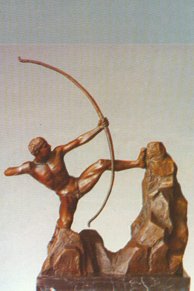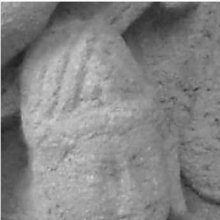Brahmashiras, Brahmaśiras, Brahma-shiras, Brahman-shiras: 9 definitions
Introduction:
Brahmashiras means something in Hinduism, Sanskrit. If you want to know the exact meaning, history, etymology or English translation of this term then check out the descriptions on this page. Add your comment or reference to a book if you want to contribute to this summary article.
The Sanskrit term Brahmaśiras can be transliterated into English as Brahmasiras or Brahmashiras, using the IAST transliteration scheme (?).
Images (photo gallery)
In Hinduism
Dhanurveda (science of warfare)
Source: Wisdom Library: DhanurvedaBrahmaśiras (ब्रह्मशिरस्) refers to a weapon (name of a missile). It is a Sanskrit word defined in the Dhanurveda-saṃhitā, which contains a list of no less than 117 weapons. The Dhanurveda-saṃhitā is said to have been composed by the sage Vasiṣṭha, who in turn transmitted it trough a tradition of sages, which can eventually be traced to Śiva and Brahmā.

Dhanurveda (धनुर्वेद) refers to the “knowledge of warfare” and, as an upaveda, is associated with the Ṛgveda. It contains instructions on warfare, archery and ancient Indian martial arts, dating back to the 2nd-3rd millennium BCE.
Purana and Itihasa (epic history)
Source: archive.org: Puranic EncyclopediaBrahmaśiras (ब्रह्मशिरस्).—See Brahmāstra.
Source: archive.org: Shiva Purana - English TranslationBrahmaśiras (ब्रह्मशिरस्) refers to “Brahmā’s head”, which was destroyed by Śiva, according to the Śivapurāṇa 2.5.13 (“Resuscitation of Indra”).—Accordingly, as Bṛhaspati eulogized Śiva: “[...] Obeisance to the destroyer of sacrifice of Dakṣa, to the bestower of fruits of sacrifice, identical with sacrifice and the initiator of the greatest rites. Obeisance to Śiva the annihilator of Time, of the form of Time, the wearer of black serpents, the great lord and the omnipresent. Obeisance to the destroyer of Brahmā’s head (brahmaśiras-hantṛ), the one eulogised by Brahmā and the moon. Obeisance to you favourably disposed to Brahmins. Obeisance to you the great soul. [...]”.

The Purana (पुराण, purāṇas) refers to Sanskrit literature preserving ancient India’s vast cultural history, including historical legends, religious ceremonies, various arts and sciences. The eighteen mahapuranas total over 400,000 shlokas (metrical couplets) and date to at least several centuries BCE.
Shaivism (Shaiva philosophy)
Source: Brill: Śaivism and the Tantric TraditionsBrahmaśiras (ब्रह्मशिरस्) refers to a type of Vrata (“observance”) [?], as quoted by Hṛdayaśiva in his Prāyaścittasamuccaya (verse 10.27-35).—Accordingly, “[...] Dressed in white, with a white turban and a white sacred thread and white unguents and garland, he should perform the observance for the vidyādhipa-mantra. Dressed in red garments and red garlands and unguents the Mantrin should first perform for one month the stated observance for the brahmaśiras. [...]”.

Shaiva (शैव, śaiva) or Shaivism (śaivism) represents a tradition of Hinduism worshiping Shiva as the supreme being. Closely related to Shaktism, Shaiva literature includes a range of scriptures, including Tantras, while the root of this tradition may be traced back to the ancient Vedas.
Languages of India and abroad
Sanskrit dictionary
Source: DDSA: The practical Sanskrit-English dictionaryBrahmaśiras (ब्रह्मशिरस्).—n. Name of a particular missile; अस्त्रं ब्रह्मशिरस्तस्मै ततस्तोषाद्ददौ गुरुः (astraṃ brahmaśirastasmai tatastoṣāddadau guruḥ) Bm.1.649.
Brahmaśiras is a Sanskrit compound consisting of the terms brahman and śiras (शिरस्). See also (synonyms): brahmaśīrṣan.
Source: Cologne Digital Sanskrit Dictionaries: Cappeller Sanskrit-English DictionaryBrahmaśiras (ब्रह्मशिरस्).—[neuter] Brahman's head, [Name] of a mythical weapon.
Source: Cologne Digital Sanskrit Dictionaries: Monier-Williams Sanskrit-English DictionaryBrahmaśiras (ब्रह्मशिरस्):—[=brahma-śiras] [from brahma > brahman] n. ‘Brahmā’s head’, Name of a mythical weapon, [Mahābhārata; Rāmāyaṇa; Harivaṃśa] (also -śīrṣan, [Bhāgavata-purāṇa])
[Sanskrit to German]
Sanskrit, also spelled संस्कृतम् (saṃskṛtam), is an ancient language of India commonly seen as the grandmother of the Indo-European language family (even English!). Closely allied with Prakrit and Pali, Sanskrit is more exhaustive in both grammar and terms and has the most extensive collection of literature in the world, greatly surpassing its sister-languages Greek and Latin.
See also (Relevant definitions)
Partial matches: Brahman, Brahma, Shiras.
Starts with: Brahmashirahkhandana, Brahmashirohantri.
Full-text (+2): Brahmashirshan, Brahmashirahkhandana, Ambaradhara, Raktanulepana, Raktamalya, Sitoshnishin, Ushnishin, Raktambara, Raktambaradhara, Ekamasha, Sitavasa, Sitanulepana, Vidyadhipavrata, Sragvin, Sitasragvin, Vidyadhipa, Astra, Mantri, Sita, Ashvatthaman.
Relevant text
Search found 12 books and stories containing Brahmashiras, Brahmaśiras, Brahma-shiras, Brahma-śiras, Brahma-siras, Brahmasiras, Brahman-shiras, Brahman-śiras, Brahman-siras; (plurals include: Brahmashirases, Brahmaśirases, shirases, śirases, sirases, Brahmasirases). You can also click to the full overview containing English textual excerpts. Below are direct links for the most relevant articles:
The Shiva Purana (by J. L. Shastri)
Chapter 36 - Śiva’s incarnation as Aśvatthāman < [Section 3 - Śatarudra-saṃhitā]
Chapter 24 - Pippalāda incarnation of Śiva < [Section 3 - Śatarudra-saṃhitā]
Ramayana (by Manmatha Nath Dutt)
Chapter XXVII < [Book 1 - Bāla-kāṇḍa]
The Bhagavata Purana (by G. V. Tagare)
Chapter 8 - Kuntī’s Eulogy of Kṛṣṇa and Yudhiṣṭhira’s Repentance < [Book 1 - First Skandha]
Chapter 7 - Punishment of Āśvatthāman < [Book 1 - First Skandha]
Chapter 12 - Birth of Parīkṣit < [Book 1 - First Skandha]
The Padma Purana (by N.A. Deshpande)
Chapter 155 - Dugdheśvara < [Section 6 - Uttara-Khaṇḍa (Concluding Section)]
Chapter 43 - Defeat of Puṣkala and Śatrughna < [Section 5 - Pātāla-Khaṇḍa (Section on the Nether World)]
Chapter 12 - The dynasty of Yadu < [Section 1 - Sṛṣṭi-khaṇḍa (section on creation)]
Harivamsha Purana (by Manmatha Nath Dutt)
Chapter 25 - An Account of the Birth of the Moon < [Book 1 - Harivamsa Parva]
The Brahmanda Purana (by G.V. Tagare)
Chapter 65 - The Nativity of Soma and Saumya < [Section 3 - Upodghāta-pāda]
